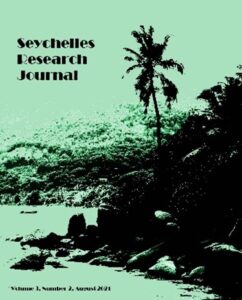News
July 31, 2025
Seychelles Research Journal

An interdisciplinary journal relies on contributors writing about their specialist subjects in a way that can appeal to readers from a diverse field; not only academics with different backgrounds but also government officials and the private sector. The authors of the present issue have risen to the challenge and offer some fascinating glimpses of Seychelles – on topics ranging from geopolitics to language, and from measures to manage climate change to the importance of Creole festivals.
At a time when conventional rules of international power relations seem to be broken, it makes sense to start this issue with an article that manages to be both historical and also highly topical at the same time. To help in our understanding of what is going on in the world, Brendon Cannon offers a fascinating analysis of past theories of geopolitics that resonate with today’s events. He turns first to the ideas of a British geographer at the start of the twentieth century, who warned that whoever controls the heartland of the Eurasian landmass would be in pole position to control the world. Is it Russia or China which is presently in the stronger position to do this?
Closer to home, Mats Deutschmann provides a helpful overview of the languages of Seychelles, showing how their use is intimately bound up with issues of history and nationhood. With three official languages in the country, Deutschmann points to how and where each one is used. Kreol Seselwa, for instance, is the medium of debate in the National Assembly, whereas English dominates in the Judiciary. French, in contrast, is used less than it used to be.
A lawyer by profession, Proceed Manatsa laments the ineffectiveness of international legislation and rulings designed to reduce the rate of global warming. He singles out for special consideration the United Nations Framework Convention on Climate Change, which led to the much-heralded Kyoto and Paris Protocols. He explains how both have failed to achieve what was expected of them and concludes with a set of thoughtful recommendations to show how progress can be made.
The fourth article is adapted from a presentation by Rosa Beunel-Fogarty, in which she explained that her doctoral research was focused on festivals and heritage in Mauritius. As a postdoctoral project, she has extended this geographically to encompass the wider network of islands in this region. She will undoubtedly unearth intriguing points of difference as well as similarity. The annual Creole Festival in Seychelles, for instance, is
Cont’d
recognized as a foremost example of its kind, helping not only to demonstrate examples
of Creole culture in this particular archipelago but also to connect with other communities across the world.
In other parts of the journal, there is an excellent conference report by Marianna Dimitrova Kucarov on an international cybernetics event held in Seychelles; a link to an article on the ability of Seychelles to manoeuvre itself in a world of bigger powers; a research note on progress in introducing sustainable energy to high-end tourist development; and a review of a recent volume edited by Srabani Roy Choudhury on the current state of play in the Indo-Pacific.

